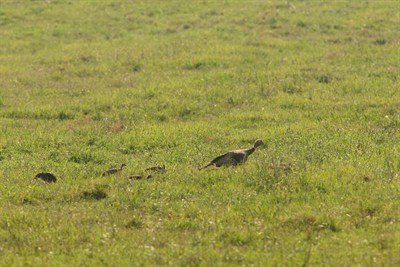Effects of Managing Wildlife Openings on Wild Turkey Reproduction in a Forested Ecosystem in Mississippi
Principal Investigator
Dr. Stephen J. Dinsmore
Mississippi State University Department of Wildlife and Fisheries
Graduate Research Assistant
Brad Holder
Mississippi State University Department of Wildlife and Fisheries
In Mississippi, the ecology of wild turkeys has been extensively studied for more than 20 years, mainly through long-term studies on Tallahala Wildlife Management Area (in the Bienville National Forest) and on private timber company lands. Collectively, these studies provided information on annual age- and sex-specific survival, nesting success, recruitment, habitat use, cause-specific mortality, and many other aspects of turkey ecology. Although these studies have provided a tremendous amount of information about turkeys in Mississippi, there are still information gaps where further research is needed. One of these areas is how habitat manipulations affect turkey reproduction.
Management of wildlife openings is one of the main opportunities for turkey habitat management on private and public lands. Basic information on turkey reproductive success is readily available, but these studies have not investigated effects of habitat management through carefully designed experiments. Turkey reproductive success can be divided into three segments: nesting success, poult (brood) survival, and juvenile survival to age one. Careful measures of each of these three components are necessary to fully understand turkey reproductive ecology.
Information on the effects of small-scale habitat manipulations on turkey reproduction will aid wildlife managers interested in better managing this species. Careful measures of nesting success and poult survival, and how they are affected by existing and experimental habitat manipulations, will provide these managers with a better understanding of some of the mechanisms influencing turkey reproduction in Mississippi and will suggest future management options.
Final Report on This Research Project
Final Presentations on this Research Project

Photo by Steve Gulledge
Monitoring wild turkey reproductive success is important to wildlife managers to track population changes over time. Although this hen probably laid a dozen eggs, she has successfully reared only four poults, most likely due to predation and poor brood-rearing habitat quality.

Graduate student Brad Holder (right) places a radio transmitter on the back of this captured hen so that he can monitor her movements, habitat selection, and reproductive success.
![]()
Graduate student Brad Holder tracks a hen turkey using radio telemetry.
Funding for this project was provided by:
 |
 |
 |
 |









